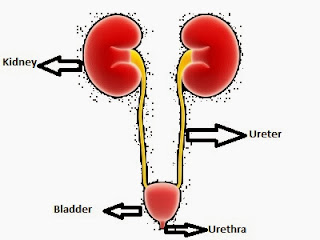Treatment
of Kidney Stones with Homeopathy
Changing lifestyles and eating habits have done more harm
than good to the human body and given rise to a menace like renal stones. We
look at the different ways to prevent the same.
Renal stones also called as Nephrolithiasis are one of the
most common health problem faced by both younger and older age groups of this
generation. We also find recurrence of
renal stones after surgical removal of renal stones (Lithotripsy).
People usually have a misconception that kidney stones is a
foreign body inside their body, this is not true ! Kidney stones are formed due to sedimentation of normal
salts as a result of defect in the renal system. These stones are formed
naturally in the body and hence removal of these stones otherwise called
calculi, should be done naturally. At Essence Homeopathic Clinics we have been
successfully treating patients where the stones have been passed naturally.
What
are the Symptoms?
Kidney stones usually
do not cause pain and in some cases they may lie dormant for long periods of
time. The pain begins when the stones travel from the kidney and enter into the
ureter, which connect the kidney to the bladder or the urethra. The pain is
very sudden, severe and it could be the worst
pain that they ever experienced. The patient will experience pains in the
sides of back, this pain may travel to the groin and to the urethra as well.
The patient may even
experience episodes of nausea and vomiting.
The stones can damage
the inner lining of the urinary tract which can cause bleeding hence the
patient may see blood mixed with urine while micturition (hematuria). This
usually occurs when the stone is travelling through the ureters. When there is
frequent painful urination / micturition it means that the stone has left the
bladder and in the urethra which is a good sign that the stone will be passed
out soon.
Types of stones:
The stones are classified based on the content of the stones
or what type of mineral they are made up of. The most common type of kidney
stone is the calcium oxalate and other less common ones are the calcium
phosphate, uric acid, struvite and Cystine stones.
Treatment of
Kidney Stones:
The most common and the best treatment would be “taking plenty of water” which helps to
flush the stones through the urine. But this method of home treatment would
work only for the stones that are small, the larger ones may require
medications or surgical intervention. The most common surgical intervention is
the ECSL – Extra corporeal shockwave lithotripsy, this is a method of using
shock waves to break the stone which in turn pass through the urine. In such
cases the recurrence of stone is common.
On the other hand, homeopathic medications are found to be
effective in breaking the stones and expelling the through the urine. The
reason why lot of patients prefer homeopathic medication is that “homeopathic medications helps to prevent
recurrence of these calculi”, hence these medications can be taken by those
patients who have underwent lithotripsy as well .
Does the
homeopath give the same medicine for all the patients with kidney stones?
NO!! There
is no fixed or combination homeopathic medicine that is found to be effective
in treating all the patients with kidney stones. If a patient does take a
combination or a complex of remedies for kidney stones then it will definitely
help to reduce the pain but it cannot expel the stone. The homeopathic
medication is selected by a qualified homeopath based on the character of the
pain, location of the pain, site of the stone, physical generals like thirst,
sleep, appetite of the patient and sometimes even the mental status of the
patient. Let me give you an example, lets assume there are two patient both
have been diagnosed with kidney stone or Nephrolithiasis.
Patient 1 – has the
kidney stone on his left kidney and has a dull aching pain which better after
micturition.
Patient 2 – has kidney stone on his right kidney and gets a
sharp shooting pain but the pain is worse during and after micturition.
Both patient 1 and patient 2 are suffering with kidney stones
but both the stones are at different location and experiencing different types
of pain hence “not all kidney stones are
alike and not all patients are alike” – this is where a homeopath individualizes the case and selects a
single or sometimes two remedies specific for patient 1 and for patient 2. This is why a homeopath needs to interact
with the patient and find out what remedy is best suited for the patient.
What is the duration of
treatment?
There is no fixed duration of treatment but its estimated
range between 1 month to 1 year for treatment. This duration depends on the
susceptibility, age, size of stone, location of the stone.
Let me give you an example:
Patient ‘A’ is having a 5mm stone in his kidney and is taking
homeopathic medication. Patient ‘B’ is having a 5mm stone in his bladder and is
on homeopathic treatment.
Generally patient ‘B’ will get treated much faster compared
to Patient A because the stone is very close to the urethra and will very soon
be expelled out .
Do’s & Don’ts :
Avoid intake of too many pain killers without your doctors
consent.
Avoid Over-dose of Calcium Supplements.
Adequate intake of water


No comments:
Post a Comment